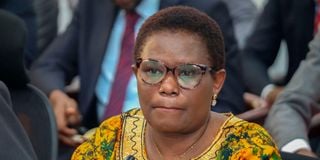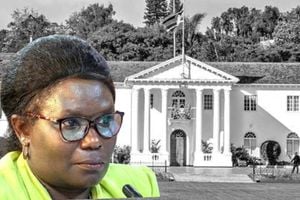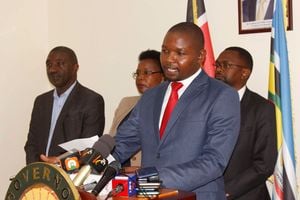
Meru Governor Kawira Mwangaza when she appeared before the Senate Committee on County Public Accounts (CPAC) chaired by Homabay Senator Moses Kajwang at the Bunge Towers Nairobi on Tuesday, July 9, 2024.
The troubled two-year tenure of impeached Meru Governor Kawira Mwangaza - who was elected as an independent - has exposed the tough balancing act for political survival of county bosses elected from minority parties.
Ms Mwangaza has however obtained a court order staying the impeachment, pending determination.
At least 10 governors with a majority of Members of County Assemblies (MCAs) elected in opposing political camps have had to make major compromises, including accommodating the political interests of ward representatives and rival outfits.
Ms Mwangaza (Independent), Governors Andrew Mwadime (Taita Taveta, Independent), Johnson Sakaja (Nairobi, UDA), Jeremiah Lomorukai (Turkana, ODM), George Natembeya (Trans Nzoia, DAP-K), Simon Kachapin (West Pokot, UDA), Jonathan Lati Lelelit (Samburu, UDA), Joseph Lenku (Kajiado, ODM), Abdi Guyo (Isiolo, Jubilee) and Issa Timamy (Lamu, ANC) all had to woo rival party MCAs to stay in office.
Interviews with some of the governors revealed the give and take of striking political compromises to ensure that county programmes are not frustrated by majority MCAs from the opposing party.
In Nairobi, Mr Sakaja had to appoint people allied to ODM leader Raila Odinga to his county government to win the support of the Azimio La Umoja One Kenya coalition, which has majority MCAs in the capital.
But Ms Mwangaza appears to have failed, becoming the first county boss to be impeached at the third attempt after being rescued by the Senate twice in two years.
Proceedings of her impeachment hearings by the Senate revealed how the assembly and local leaders elected on other political platforms have turned against her leadership.
The Meru County Assembly has 45 elected MCAs. A total of 25 of the MCAs were elected under parties affiliated to the opposition Azimio la Umoja One Kenya Coalition, while 14 were elected under partner parties of the Kenya Kwanza Alliance. The rest were elected on tickets of fringe outfits.
In his testimony, former Meru County Assembly Majority Leader Evans Mawira, the mover of the second impeachment motion last year, who became the governor's witness, recounted how the MCAs were facilitated to ensure that the governor was impeached.
Hatching impeachment
"I was personally called to a meeting by the Meru County UDA coordinator. We met with the Meru MP caucus leader, MP (Mugambi) Rindikiri and Senator Kathure Murungi and we took a decision, which we communicated to other members, to withdraw our support for the governor and table a fresh impeachment motion.
"We were facilitated by the Assembly to be in Nairobi for five days with a daily allowance of Sh14,000 and we were facilitated by being given transport back and forth," Mr Mawira revealed.
In the last elections, Mr Sakaja was the only UDA candidate elected at county level in the capital city. The UDA lost the senate and women's representative positions to Mr Odinga's ODM. Of the 17 constituencies, Mr Odinga's opposition swept most of the seats, with the UDA winning only three.
"UDA lost both the senate and women's representative positions. We (UDA) got four out of 17 MP seats. Out of 85 MCA seats we only got 35. When you get into a situation like that, you have to wake up to reality and work with all the political players," Mr Sakaja said.
"That means having an open consultation. You involve the elected leaders and their party leaders. In the beginning I had more problems with my own UDA, but when we negotiated with the majority side about sharing House committees, they realised they all benefited from working together," he said.
He revealed one instance when he had to rush to meet Mr Odinga and other ODM leaders before meeting President William Ruto.
"That day was very interesting. I was with the President; I told him I have to go now and meet Raila and his team and then come back and meet him with the UDA MPs. I am not ashamed to talk to leaders across the divide. In Kenya, leadership and politics have been seen as an enemy. But politics should not be an enemy. It is a contest of ideas," he said.
Lone wolves
Machakos Deputy Governor Francis Mwangangi told the Nation that some governors end up in trouble because they try to operate as lone wolves. He said the only way to survive political machinations was to bring all political players on board by involving them in county programmes.
"Any elected leader at any level needs to know that there are various stakeholders that he/she needs to constantly consult for political survival," said Mr Mwangangi.
"If you don't have the spirit of teamwork, you will definitely run into problems with other local leaders. You also have to keep an eye on what kind of politics is going on at both local and national levels," he added.
In Kajiado, Mr Lenku has developed a cordial working relationship with the UDA MCAs. He has also expressed support for President Ruto's administration. In the county, Kenya Kwanza has a slim majority of 13 to Azimio's 12.
Governor Guyo has also managed to reach out to UDA MCAs. Mr Guyo was elected under Jubilee, which does not have a single MCA seat in the county.
Others who have had to find a way to work with rival parties include Mr Lomorukai (ODM) and Mr Natembeya (DAP-K). Their assemblies are dominated by UDA MCAs.
Mr Lomorukai was elected under the ODM, which won only three of the 30 county assembly seats in Turkana County. In Trans Nzoia, Azimio is in the minority with only nine MCAs compared to Kenya Kwanza's 16, forcing Mr Natembeya to find ways to work with the majority.
In West Pokot, Governor Kachapin (UDA) has nine MCAs elected on the same ticket in a county of 20 wards.
Mr Lelelit, who was elected on a UDA ticket, has an assembly with a majority of MCAs elected on Azimio-linked parties. Azimio won nine seats to Kenya Kwanza's six.







